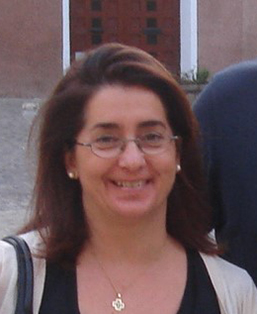


Born in Pamplona. She holds an honours degree in Philosophy and Literature from the History Department of the University of Navarra. She completed her doctoral studies in the History program. She holds a master’s degree in Library Science from the University of the Basque Country. Between 1994 and 1999, she worked on cataloguing public and private libraries in Vitoria-Gasteiz. Since 1999, she has been working in the Historical Archive of the 20th Century Spanish History Group, which was integrated into the General Archive of the University of Navarra in 2006.
She is a member of the Association of Archivists of Navarra (AAN) and coordinates the Work Group on Personal Archives of the Conference of Archivists of Spanish Universities (CAU). She has given training courses on archiving and has presented papers at various conferences on personal archives and how to access to these types of collections.
She is the Deputy Director of the General Archive of the University of Navarra since 2011.
«El olimpismo en el archivo personal de Pedro J. Matheu»
(Olympism in the personal archive of Pedro J. Matheu)
Pedro Jaime Matheu’s personal collection is preserved in the General Archive of the University of Navarra. Once organized and classified, given the historical value of the documents it contains, it was decided to hold an exhibition with the documents on Olympism that Pedro J. Matheu himself created and collected during his professional activity and his life trajectory. The organization of this activity to spread his legacy made it possible to carry out a more complete study of Pedro Jaime Matheu and his time, and to show his contribution to women’s participation in the Olympic Games.
Pedro Jaime de Matheu (San Miguel, 8 March 1865 – Madrid, 30 August 1940)
He was Consul General of El Salvador in Spain and France, and Chargé d’Affaires of El Salvador in Paris. He was also Consul General of Costa Rica, Honduras and Nicaragua in Paris. He held numerous representative positions for his country: special delegate for the commemoration of the Third Centenary of Don Quixote, special envoy to the wedding of King Alfonso XIII, member of the Court of Arbitration in The Hague. He was a member of the International Olympic Committee, representing Central America, as well as chairman and secretary-general of the Central American Olympic Committee.
He also held positions in other organisations, such as delegate of the France-America Society, member of Unión General Hispano-Americana and technical adviser of Casa América in Barcelona. He was also a correspondent for Salvadoran, Spanish and French newspapers.
The primary type of documentation is correspondence, although notes, photographs and abundant supporting documentation on the Olympic Games and the International Olympic Committee were also preserved.
The appeal of this experience is to show the importance of the documentation that is preserved in personal collections for conducting research on the past, with real and truthful evidence by the very protagonists of history. In this case, these documents are a testimony of a turbulent time between two world wars that changed our future forever.
The documentation studied here shows how, in the twenties and thirties of the 20th century, the sports field attempted to spread the values of Olympism and its benefits throughout the world. Specifically, Pierre de Coubertin’s interest in expanding into Central America and the invaluable collaboration of Pedro J. Matheu in carrying out this venture.
In addition, one of the main contributions of this great diplomat was his support of women’s participation in Olympic sports. On April 24, 1931, the 29th IOC session was held in Barcelona. One of the topics discussed during this session was women’s participation in the Olympic Games. There was a major debate on this issue, with much reluctance. One of the keynote speakers was Pedro J. Matheu, a representative of the Central American countries, who read a positive manifesto and contributed to the final approval of women’s participation in the 1932 Los Angeles Olympics in five sports: skating, gymnastics, swimming, athletics and fencing (for the last two, only in a few disciplines).
During those interwar years, women had entered many of the work and social spheres. What is left of this fundamental contribution to their participation in the world of sports, among the documentation of one of its protagonists? Truth be told, very little is left: a booklet entitled “La nueva gimnasia femenina en Finlandia” [The New Women’s Gymnastics in Finland], by Elli Björkstén, which proves his interest in the subject, but mainly a letter from the president of the Women’s Sports Federation addressed to Pedro J. Matheu, on the 6 July 1929, in which she thanked him for his defence of the female cause and his support during the Olympic discussions. This letter, sent two years before the 1931 IOC session in Barcelona, proves his commitment to defending the rights of women to participate in the Olympic Games.
The letter also highlights one of the main values of the documents —their evidential value— and the importance of their preservation for the defence of human rights both now and, above all, in the future.